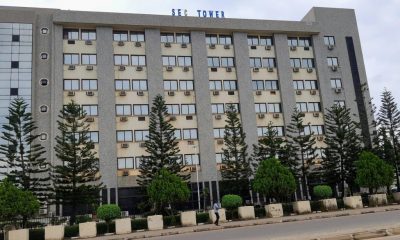Economy
Amosun Tasks SEC to Explore Areas to Improve Government Revenue

By Aduragbemi Omiyale
The Chairman of the Senate Committee on Capital Market, Mr Ibikunle Amosun, has appealed to the Securities and Exchange Commission (SEC) to think outside the box and come up with ways the federal government can generate more funds and improve the economy.
The current administration under President Muhammadu Buhari has plunged the nation into huge debts, and despite earning from crude oil sales and raising taxes, the country is unable to fund its budget without borrowing.
This has put the economy under pressure as most revenues generated are used to service debts, making many citizens worry about the future of the nation.
But the immediate past Governor of Ogun State believes that the capital market has the capacity to assist Nigeria in achieving its economic goals if given the needed support.
Speaking at the budget defence exercise by SEC in Abuja, the chartered accountant advised the agency to explore other areas that could aid in revamping the economy and improve government revenue, promising that the apex regulatory agency in the Nigerian capital market of the support of the parliament.
“The capital market is very important to the development of any economy. When the economy is stressed, the capital market can help,” he said, noting that the committee is very interested in the activities of the market as it is capable of providing the country with the needed long-term funding to get out of the woods as well as fund the budget.
He stated that the capital market in Nigeria was important to the economy of the nation as it was capable of providing the government with the much-needed revenue for infrastructural development.
“We know that globally, nations have been suffering the effects of COVID-19, and Nigeria is no exception. But we believe that with a vibrant capital market, our growth and development will be faster.
“We now know what the capital market can do to rescue the economy at a time like this. If we have to diversify our economy, the capital market has a role to play, which is why we are here to support you. We will support the capital market for our country to realise these economic goals.
“That is why the Senate is very interested in ensuring that our capital market does well. We are here to encourage you in the work that you do to ensure that we achieve success. We will encourage companies to list so as to further deepen the capital market,” he said.
Mr Amosun, who is not returning to the Senate next year, commended the management of SEC for its efforts to deepen the market.
Earlier in his presentation, the Director-General of SEC, Mr Lamido Yuguda, told the senators that despite the global economic climate the world over, the commission had been able to improve its budget performance.
Mr Yuguda stated that due to a series of interactions with the lawmakers in the past, the organisation has been able to explore various areas in a bid to shore up its finances.
“This improvement in our performance is as a result of some of the fees that we introduced at the beginning of this year.
“When we came to you last year, the commission was facing a very difficult financial situation. We had various interactions with this committee, and we were asked to think outside the box so that we could bring measures to improve our performance.
“It is these measures that we started to introduce that have led to an improvement in our performance. We looked inwards and introduced various measures that drastically cut down our expenditures.
“We had a staff strength that we said was top heavy, and we were able to implement voluntarily early retirement programme in 2021 and concluded in December 2021.
“We also turned our attention to the revenue side and we looked at certain areas like the fixed-income market. The fixed-income market is highly regulated by the commission but was not generating revenues for the SEC, so from January 2022, we started accessing a small fee from the secondary fixed-income market. So, it is the combined effect of this that you see in the revenue performance of the commission,” Mr Yuguda said.
He stated that the agency looked at the Collective Investment Scheme sector and explored avenues of improving its performance in a bid to increase the revenues of the organisation.
“The collective investment scheme is one of the areas that account for our improved performance. It has been with us for a decade, but the Commission has not been taking revenues from that sector.
“We have an investment management department, which is devoted to the regulation of the collective investment schemes; we have other services like the monitoring department, which goes out and monitors.
“In terms of funds on this particular side of the market, we have not been taking in many revenues.
“So, effective January 2022, as we announced last year, the commission started taking less than 0.5 per cent of the funds in collective investments schemes so that it will help the commission give good regulation and oversight,” he stated.
Economy
Seven Price Gainers Boost NASD OTC Bourse by 2.19%

By Adedapo Adesanya
Seven price gainers flipped recent declines at the NASD Over-the-Counter (OTC) Securities Exchange, raising the alternative stock market by 2.19 per cent on Friday.
According to data, the market capitalisation added N51.24 billion to end N2.389 trillion compared with the previous day’s N2.338 trillion, while the NASD Unlisted Security Index (NSI) climbed 85.65 points to close at 3,994.32 points, in contrast to the 3,908.67 points it ended a day earlier.
Business Post reports that the advancers were led by MRS Oil Plc, which improved its value by N13.00 to N200.00 per share from N187.00 per share, FrieslandCampina Wamco Nigeria Plc gained N7.40 to settle at N91.55 per unit versus the previous day’s N84.15 per unit, Central Securities Clearing System (CSCS) Plc appreciated by N6.08 to N71.00 per share from N64.92 per share, Afriland Properties Plc added 66 Kobo to finish at N17.17 per unit versus N16.51 per unit, IPWA Plc rose 37 Kobo to N4.15 per share from N3.78 per share, First Trust Mortgage Bank Plc grew by 11 Kobo to N1.20 per unit from N1.09 per unit, and Food Concepts Plc went up by 10obo to N3.70 per share from N3.60 per share.
On the flip side, there were two price losers led by Geo-Fluids Plc, which depreciated by 28 Kobo to N3.32 per unit from N3.60 per unit, and Industrial and General Insurance (IGI) Plc dropped 5 Kobo to sell at 45 Kobo per share from 50 Kobo per share.
Yesterday, the volume of trades went down by 92.0 per cent to 3.7 million units from 45.8 million units, the value of transactions fell by 59.4 per cent to N84.5 million from N208.2 million, while the number of deals went up by 7.7 per cent to 42 deals from 39 deals.
CSCS Plc remained the most traded stock by value (year-to-date) with 32.6 million units exchanged for N1.9 billion, trailed by Geo-Fluids Plc with 119.6 million units valued at N470.3 million, and Resourcery Plc with 1.05 billion units traded at N408.6 million.
Resourcery Plc closed the day as the most traded stock by volume (year-to-date) with 1.05 billion units sold for N408.7 million, followed by Geo-Fluids Plc with 119.6 million units worth N470.3 million, and CSCS Plc with 32.6 million units worth N1.9 billion.
Economy
FX Demand Worries Weaken Naira to N1,346/$1 at Official Market

By Adedapo Adesanya
The Naira weakened further against the United States Dollar in the Nigerian Autonomous Foreign Exchange Market (NAFEX) on Friday, February 20, by N4.97 or 0.37 per cent to N1,346.32/$1 from the N1,341.35/$1 it was transacted on Thursday.
Heightened FX demand tilted the market toward the downside yesterday, exerting upward pressure on rates despite efforts by the Central Bank of Nigeria (CBN) to stabilise the foreign exchange market.
Also in the official market, the domestic currency depreciated against the Pound Sterling during the session by N9.39 to sell for N1,815.25/£1 versus the previous day’s N1,805.86/£1, and lost N7.33 against the Euro to close at N1,584.62/€1 compared with the preceding session’s N1,577.29/€1.
The story was not different for the Nigerian Naira at the GTBank FX desk, where it depleted against the Dollar by N7 on Friday to quote at N1,356/$1 versus the N1,349/$1 it was sold a day earlier, but remained unchanged in the black market at N1,370/$1.
It was observed that risky sentiment among Foreign Portfolio Investors (FPIs) contributed to the FX market, amid fears of hot money flight due to capital gains tax and other factors.
As for the cryptocurrency market, it was mostly green yesterday in reaction to a Supreme Court verdict dismissing a fresh 10 per cent global levy by President Donald Trump.
The apex court on Friday described Mr Trump’s global tariff rollout as illegal. The decision did not clarify what should happen to tariff revenue already collected, and it doesn’t necessarily spell the end of the trade agenda, with multiple legal and executive avenues still available.
Litecoin (LTC) grew 2.7 per cent to $55.00, Cardano (ADA) appreciated 2.6 per cent to trade at $0.2815, Binance Coin (BNB) expanded by 2.6 per cent to $627.19, Dogecoin (DOGE) recouped 1.3 per cent to quote at $0.1, Ripple (XRP) jumped 0.7 per cent to $1.43, Solana (SOL) improved by 0.5 per cent to $84.15, and Ethereum (ETH) soared 0.1 per cent to $1,962.78.
However, Bitcoin (BTC) lost 0.2 per cent to sell for $67,850.49, while the US Dollar Tether (USDT) and the US Dollar Coin (USDC) traded flat at $1.00 each.
Economy
Fidson, Jaiz Bank, Others Keep NGX in Green Territory

By Dipo Olowookere
A further 0.99 per cent was gained by the Nigerian Exchange (NGX) Limited on Friday after a positive market breadth index supported by 53 price gainers, which outweighed 23 price losers, representing bullish investor sentiment.
During the trading day, the trio of Jaiz Bank, Fidson, and NPF Microfinance Bank chalked up 10.00 per cent each to sell for N11.00, N86.90, and N6.27, respectively, while Deap Capital appreciated by 9.96 per cent to N7.62, and Mutual Benefits increased by 9.94 per cent to N5.42.
Conversely, Secure Electronic Technology shed 10.00 per cent to trade at N1.62, Sovereign Trust Insurance slipped by 9.73 per cent to N2.32, Ellah Lakes declined by 7.91 per cent to N12.80, International Energy Insurance retreated by 5.56 per cent to N3.40, and ABC Transport moderated by 5.26 per cent to N9.00.
Data from Customs Street revealed that the insurance counter was up by 2.52 per cent, the industrial goods sector grew by 2.28 per cent, the banking space expanded by 1.43 per cent, the consumer goods index gained 1.23 per cent, and the energy industry rose by 0.05 per cent.
As a result, the All-Share Index (ASI) went up by 1,916.20 points to 194,989.77 points from 193,073.57 points, and the market capitalisation moved up by N1.230 trillion to N125.164 trillion from Thursday’s N123.934 trillion.
Yesterday, investors traded 820.5 million stocks valued at N28.3 billion in 63,507 deals compared with the 898.5 million stocks worth N38.5 billion executed in 61,953 deals, showing a jump in the number of deals by 2.51 per cent, and a shortfall in the trading volume and value by 8.68 per cent and 26.49 per cent apiece.
Closing the session as the most active equity was Mutual Benefits with 79.0 million units worth N427.1 million, Zenith Bank traded 44.0 million units valued at N3.8 billion, Chams exchanged 43.9 million units for N182.0 million, AIICO Insurance transacted 42.4 million units valued at N179.8 million, and Veritas Kapital sold 36.0 million units worth N90.6 million.
-

 Feature/OPED6 years ago
Feature/OPED6 years agoDavos was Different this year
-
Travel/Tourism10 years ago
Lagos Seals Western Lodge Hotel In Ikorodu
-

 Showbiz3 years ago
Showbiz3 years agoEstranged Lover Releases Videos of Empress Njamah Bathing
-

 Banking8 years ago
Banking8 years agoSort Codes of GTBank Branches in Nigeria
-

 Economy3 years ago
Economy3 years agoSubsidy Removal: CNG at N130 Per Litre Cheaper Than Petrol—IPMAN
-

 Banking3 years ago
Banking3 years agoSort Codes of UBA Branches in Nigeria
-

 Banking3 years ago
Banking3 years agoFirst Bank Announces Planned Downtime
-

 Sports3 years ago
Sports3 years agoHighest Paid Nigerian Footballer – How Much Do Nigerian Footballers Earn
























